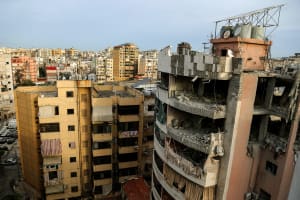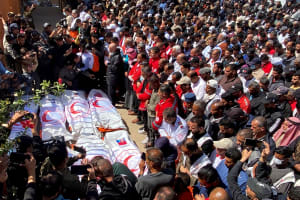Thousands attend Passover priestly blessing at Western Wall in Jerusalem
Despite Palestinians again barricading themselves inside Al Aqsa Mosque, hundreds of Jews ascended to the Temple Mount as well

More than 15,000 people gathered at the Western Wall for the traditional recitation of the priestly blessing during Passover, according to Israel Police estimates.
While religious Jews will recite the priestly blessing in any prayer group with at least person of priestly descent (Cohen), the public recitation of the priestly blessing at the Western Wall happens twice a year, during Passover (Feast of Unleavened Bread) and Sukkot (Feast of Tabernacles).
The tradition, which goes back to the Second Temple Period, was restarted in 1970, during the latter days of the War of Attrition, the period of sporadic conflict between Israel and Egypt following the 1967 Six Day War. The mass prayers were re-established by Jerusalem's Rabbi Menachem Mendel Gafner, who remembered that the Mishnah describes the priestly blessing as taking place after the destruction of the Temple. It has been held every year since.
This year, crowds were slightly smaller in number due to increased security concerns following escalations in violence between Israel and Palestinian terror groups.
Some worshippers chose to attend without their children due to the increased threat. Ohad David, a resident of the settlement of Givat Ze’ev, decided to go to the Wall without his three boys, as he had originally planned.
David said he was not willing to abandon tradition, but added, “there’s no need to pretend the circumstances are ideal for bringing children to the Old City.”
Amid anticipation of potential violence, 2,500 Israeli police officers were stationed in Jerusalem today with Israel Defense Forces announcing it would also send troops to reinforce the police.
After several Palestinians again barricaded themselves inside the Al Aqsa Mosque on Saturday night, there was uncertainty about whether Jewish visitors would be allowed to ascend to the Temple Mount on Sunday morning. However, reports indicated that over 800 Jewish worshippers participated in the pilgrimage to the Temple Mount on Sunday, an increase in attendance over last year.
The Jewish Temple Mount Administration, which organizes non-Muslim visits to the Temple Mount, thanked National Security Minister Itamar Ben Gvir and Israel Police Chief Kobi Shabtai for their dedication “to permit the entry of Jewish worshippers to the site.”
On Sunday morning, the Israeli Foreign Ministry commented on Twitter about the lack of violence.
Posting two side-by-side videos, the post read: “Freedom of worship in Jerusalem during Passover and Ramadan.”
Freedom of worship in Jerusalem during Passover and Ramadan:
— Israel Foreign Ministry (@IsraelMFA) April 9, 2023
This morning thousands of Jewish worshippers are attending the morning prayer at the Western Wall, while it’s quiet and peaceful at Al-Aqsa Mosque compound. pic.twitter.com/EkET1hJGYH
Following last week’s incident, with Palestinian militants barricading themselves inside Al Aqsa Mosque, refusing to let worshippers in or out, the Israel Police entered and forcefully reopened the site.
That move was widely condemned by various Muslim countries, although only the United Arab Emirates condemned the actions of Palestinians.
Following measures taken by the Israel Police, the Jordanian Ministry of Foreign Affairs and Expatriates condemned the operation to reopen the site, blaming Israel for escalating the situation and attacking holy sites. In response, the Israel Foreign Ministry called on Jordan and the Waqf Authority, which are supposed to protect the sanctity of the site, to immediately remove extremists from the mosque.
“Those who desecrate the sanctity of the Al-Aqsa Mosque and barricade themselves inside it are a dangerous mob, radicalized and incited by Hamas and other terror organizations,” the statement said.
1/2 Following the announcement of the Jordanian Ministry of Foreign Affairs:
— Israel Foreign Ministry (@IsraelMFA) April 8, 2023
Those who desecrate the sanctity of the Al-Aqsa Mosque and barricade themselves inside it are a dangerous mob, radicalized and incited by Hamas and other terror organizations. https://t.co/RJJKXoM3Uk
Ben Gvir also announced that he opposes closing the Temple Mount to Jews on the seventh day of Passover. The action has been customary since 2013, but Ben Gvir said he believes the closure will “endanger the worshippers who come to the Western Wall, in addition to being a reward to terrorists after they issue threats.”
The previous Israeli government under Naftali Bennett and Yair Lapid closed the Temple Mount to Jewish visitors for the last ten days of Ramadan.
“The closure of the Mount during these ten days is a new decision by the Bennett government and not a practice or status quo," Ben Gvir said at the time.

The All Israel News Staff is a team of journalists in Israel.














